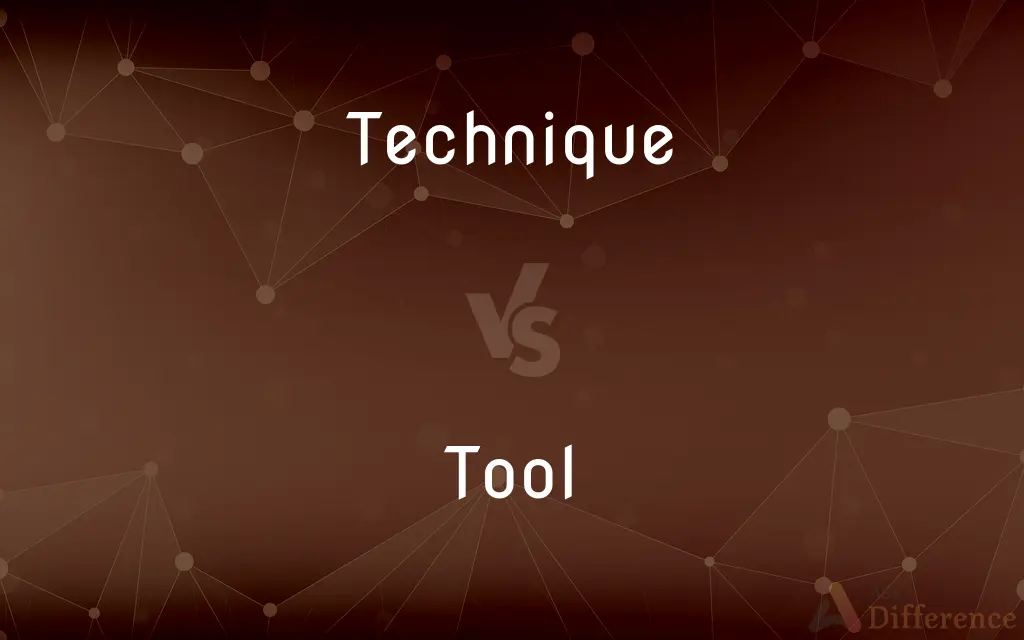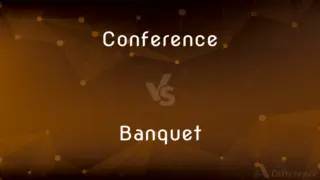Technique vs. Tool — What's the Difference?
By Fiza Rafique & Maham Liaqat — Updated on March 1, 2024
Technique refers to a method or way of doing something, emphasizing skill and procedure. A tool is a physical object or software used to perform a task, facilitating the application of techniques.

Difference Between Technique and Tool
Table of Contents
ADVERTISEMENT
Key Differences
Techniques are the strategies or approaches adopted to achieve a specific task, solve a problem, or create something. They encompass the skills, methods, and procedures that individuals use, often honed through practice and experience. Tools, in contrast, are tangible items or software that assist in performing tasks. They can be as simple as a hammer for driving nails or as complex as computer software used for data analysis.
Techniques are abstract and can be applied in various fields, from artistic expression and scientific research to culinary arts and sports. For example, the technique of brushstrokes in painting affects the texture and appearance of the artwork. Tools are often designed to facilitate specific techniques, making tasks easier, more efficient, or possible to accomplish. While a technique can be executed with different tools or sometimes no tool at all, the choice of tool can significantly influence the efficiency and outcome of the task at hand.
The relationship between technique and tool is symbiotic. Mastery of a technique often involves learning how to effectively use related tools, while the development of new tools can lead to the evolution of techniques. For instance, the advent of digital cameras has transformed photographic techniques, expanding the possibilities for photographers to capture and manipulate images.
Techniques rely on the knowledge, creativity, and skill of the person, tools depend on their availability and accessibility. An individual's expertise in a particular technique can greatly influence the effectiveness of the tool being used. Conversely, access to advanced tools can enhance one's ability to perform complex techniques more easily or to a higher standard.
Techniques and tools are both essential to the execution of tasks across different domains. Techniques embody the abstract knowledge and skill, whereas tools are the practical means through which these techniques are applied. Understanding the interplay between the two is key to mastering any craft or profession.
ADVERTISEMENT
Comparison Chart
Nature
Abstract method or approach.
Tangible item or software.
Focus
How a task is performed.
What is used to perform a task.
Dependency
Relies on skill, knowledge, and practice.
Depends on physical existence or software.
Variation
Can be adapted or modified based on context.
Specific to tasks but can be versatile.
Relationship
Can be executed with various tools.
Facilitates the application of techniques.
Compare with Definitions
Technique
Meditation.
Breathing techniques are fundamental to effective meditation.
Tool
Microscope.
Scientists rely on microscopes as tools to observe microscopic organisms.
Technique
Scientific method.
Researchers use a systematic technique to test their hypotheses.
Tool
Hammer.
A hammer is an essential tool for carpentry.
Technique
Brushstroke in painting.
The artist's unique brushstroke technique gives life to the canvas.
Tool
Software.
Graphic designers use specialized software tools for creating digital art.
Technique
Baking bread.
The technique of kneading dough is crucial for soft bread.
Tool
Calculator.
Students use calculators as tools to solve complex mathematical problems.
Technique
Coding.
The technique of pair programming enhances coding efficiency and collaboration.
Tool
A tool is an object that can extend an individual's ability to modify features of the surrounding environment. Although many animals use simple tools, only human beings, whose use of stone tools dates back hundreds of millennia, have been observed using tools to make other tools.
Technique
The basic method for making or doing something, such as an artistic work or scientific procedure
Learned the techniques involved in painting murals.
Tool
Kitchen knife.
A sharp kitchen knife is a vital tool for any chef.
Technique
Skill or command in a particular activity
A pianist with superb technique.
Tool
A device or implement, especially one held in the hand, used to carry out a particular function
Gardening tools
Technique
(uncountable) The practical aspects of a given art, occupation etc.; formal requirements.
Tool
A distinct design in the tooling of a book.
Technique
(uncountable) Practical ability in some given field or practice, often as opposed to creativity or imaginative skill.
Tool
A device, such as a saw, shovel, or drill, used to perform or facilitate manual or mechanical work.
Technique
(countable) A method of achieving something or carrying something out, especially one requiring some skill or knowledge.
Tool
A machine, such as a lathe, used to cut and shape machine parts or other objects.
Technique
The method or manner of performance in any art; - also called technic.
Tool
A person or group which is used or controlled, usually unwittingly, by another person or group.
He was a tool, no more than a pawn to her.
Technique
A practical method or art applied to some particular task
Tool
A person used as an instrument by another person; - a word of reproach; as, men of intrigue have their tools, by whose agency they accomplish their purposes.
I was not made for a minion or a tool.
Technique
Skillfulness in the command of fundamentals deriving from practice and familiarity;
Practice greatly improves proficiency
Tool
A person who is controlled by others and is used to perform unpleasant or dishonest tasks for someone else
Tool
Obscene terms for penis
Tool
Drive;
The convertible tooled down the street
Tool
Ride in a car with no particular goal and just for the pleasure of it;
We tooled down the street
Tool
Furnish with tools
Tool
Work with a tool
Common Curiosities
Can a technique exist without tools?
Yes, some techniques, especially those related to cognitive processes or physical exercises, can be performed without any tools.
Can the same tool be used for multiple techniques?
Yes, many tools are versatile and can be used to support different techniques across various tasks.
How do advancements in technology affect techniques?
Technological advancements can lead to the development of new techniques or the refinement of existing ones, expanding what is possible to achieve.
Are digital tools considered real tools?
Yes, digital tools, such as software and applications, are considered real tools that facilitate various tasks and processes.
Can tools compensate for a lack of technique?
While tools can make certain tasks easier, a fundamental understanding and application of the necessary techniques are essential for achieving high-quality results.
Is it more important to master techniques or to have access to tools?
Mastery of techniques is fundamental, as it allows for adaptability and innovation. However, access to tools can significantly enhance the application and effectiveness of these techniques.
How can one improve their technique?
Improving technique typically involves practice, feedback, studying the work of experts, and sometimes, learning to use tools more effectively.
Do professionals focus more on technique or tools?
Professionals often focus on both, recognizing that a deep understanding of techniques and proficient use of tools are key to excellence in their field.
How does one choose the right tool for a technique?
Choosing the right tool often depends on the specific requirements of the task, the user's familiarity with the tool, and the desired outcome.
How do cultural differences influence techniques and tools?
Cultural differences can influence the development and preference for certain techniques and tools, reflecting historical, environmental, and social factors.
Share Your Discovery

Previous Comparison
Conference vs. Banquet
Next Comparison
Loud vs. SoftAuthor Spotlight
Written by
Fiza RafiqueFiza Rafique is a skilled content writer at AskDifference.com, where she meticulously refines and enhances written pieces. Drawing from her vast editorial expertise, Fiza ensures clarity, accuracy, and precision in every article. Passionate about language, she continually seeks to elevate the quality of content for readers worldwide.
Co-written by
Maham Liaqat















































